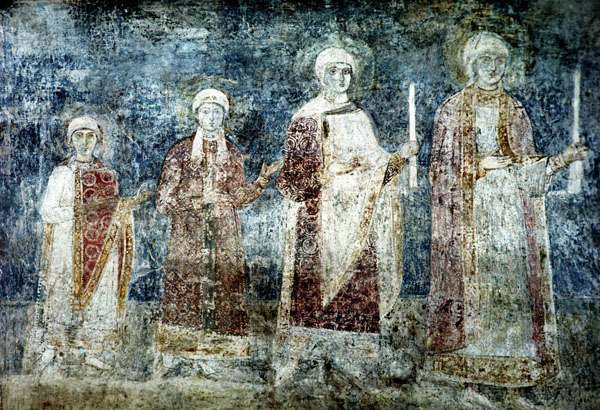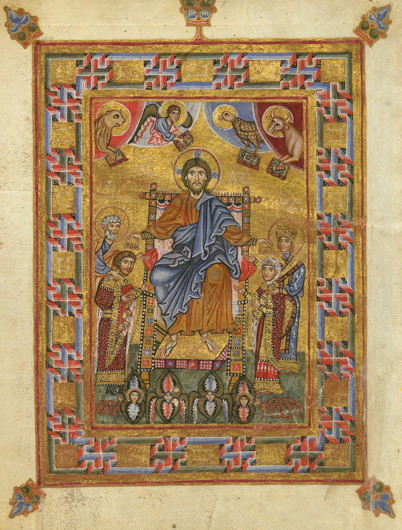Rus’
Rus’ [Русь]. The former name of Ukraine. In the Kyiv Chronicle the term was a collective noun (ie, ‘the Rus'’) referring initially to the Varangians and then to the land of the Polianians around Kyiv bounded by a triangle formed by the Dnipro River, Irpin River, and Ros River. Gradually it came to signify the entire realm of the grand prince of Kyiv (Kyivan Rus’). Inhabitants of Kyivan Rus’ and later Ukraine were called rusyny (Ruthenians)—a designation that remained in use in Galicia, Bukovyna, and Transcarpathia until the 20th century.
There are still many disputed, inconclusive hypotheses on the origin of the name. One is that its etymology is Norse, or more exactly, Swedish. This Normanist theory, first propounded by G.S. Bayer in the early 18th century, is based on the evidence of the Kyiv Chronicle and 9th- and 10th-century West European, Arabic, and Byzantine sources. In De administrando imperio Emperor Constantine VII Porphyrogenitus provided separate ‘Rus'’ (Norse) and Slavic names for the Dnipro Rapids. At that time (and even now), the Finns called the Swedes Ruotsi. Although there is no evidence for a Swedish tribe by that name, it has been inferred that the Finns derived Ruotsi from the Swedish Róþsmenn (‘seafarers’; cf Old Swedish rōþer ‘rudder’ or rođhr ‘rowing’). One weakness of the theory is that it fails to explain why a Finnish term was adopted for a state founded by Swedes. Nor does it explain the appearance of the term Rōs in 8th-century Byzantine sources (and once in a 5th-century source, in connection with the Hunnic (see Huns) attack of 434–7), before the Varangian route to the Byzantines had been established. Some scholars, such as E. Kunik (1875), Aleksei Shakhmatov (1904), and A. Stender-Petersen (1953), have tried to overcome this objection by positing earlier stages of Germanic (Varangian/Gothic) colonization.
Anti-Normanists have put forth the theory of the autochthonous origin of the term ‘Rus'.’ Beginning with Mykhailo Maksymovych in 1837, they have proposed etymologies based on the names of the Ros River and the Rusna River and have posited that the Varangians were multiethnic, multilingual companies of mercenaries and traders consisting of Norsemen, Balts, and Slavs. This theory does not explain, however, the fact that the names of known Varangian dukes and warriors are of Swedish origin.
Supporters of a third theory, that ‘Rus'’ is of Iranian origin, derive the etymology of the term from the Iranian tribe of the Roxolani (from Iranian rokhs ‘light’). Although it suitably explains the early occurrences of the name, this theory is vitiated by historical and geographic evidence. The Roxolani lived in the Don River Basin, whereas ‘Rus'’ was first used in reference to the Polianian land. Interpretations of the term as being simultaneously of Iranian origin in the Don Basin and of Gothic origin along the Dnipro River (eg, by V. Mavrodin), or as having been transferred from a Varangian kaganate along the Don to Kyiv (eg, by George Vernadsky), are in fact compromises with the Normanist theory.
BIBLIOGRAPHY
Brim, V. ‘Proiskhozhdenie termina "Rus’",’ Rossiia i Zapad, 1 (Petrograd 1923)
Smal-Stocky, R. The Origin of the Name ‘Rus'’ (Winnipeg 1949)
Simpson, G. The Names ‘Rus'’, ‘Russia’, ‘Ukraine’ and Their Historical Background (Winnipeg 1951)
Stender-Petersen, A. ‘Zur Rus'-Frage,’ Varangica (Aarhus 1953)
Vernadsky, G. ‘The Origin of the Name “Rus'”,’ Südostforschungen, 15 (1956)
Ekblom, R. ‘Roslagen-Russland,’ Zeitschrift für slavische Philologie, 26 (1957)
Müagiste, J. ‘Ruotsi, est. Rootsi m.m. i de finsk-ugriska spraaken,’ Arkiv för nordiska filologi, 73 (1958)
Otrębski, J. ‘Rus’,’ Lingua Posnaniensis, 8 (1960)
Hens'ors'kyi, A. ‘Termin “Rus'” (ta pokhidni) v drevnii Rusi i v period formuvannia skhidnoslov’ians’kykh narodnostei i natsii,’ Doslidzhennia i materialy z ukraïns'koï movy, 5 (1962)
Lehr-Spławinski, T. ‘Z rozważań o pochodzeniu nazwy Ruś,’ in Symbolae linguisticae in honorem Georgii Kuryłowicz (Wrocław 1965)
Falk, K.-O. ‘Kilka uwag o nazwie Ruś,’ Lingua Posnaniensis, 12–13 (1968)
Pritsak, Omeljan. The Origin of Rus' , 1 (Cambridge, Mass 1981)
George Yurii Shevelov
[This article originally appeared in the Encyclopedia of Ukraine, vol. 4 (1993).]

%20family%20of%20Sviatoslav%20II%20Yaroslavych.jpg)


.jpg)